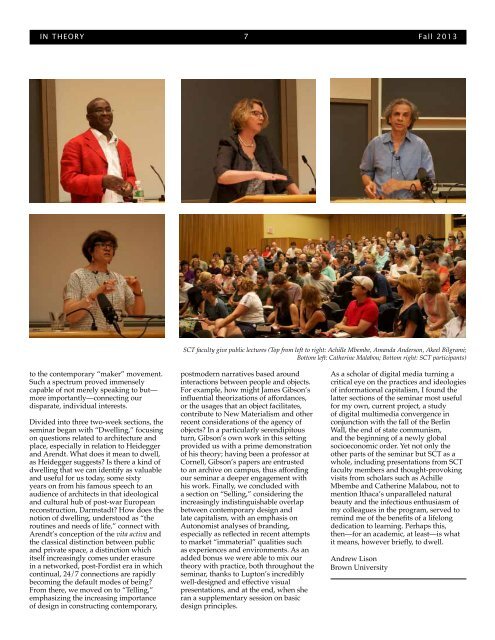to read our newsletter. - The School of Criticism and Theory - Cornell ...
to read our newsletter. - The School of Criticism and Theory - Cornell ...
to read our newsletter. - The School of Criticism and Theory - Cornell ...
Create successful ePaper yourself
Turn your PDF publications into a flip-book with our unique Google optimized e-Paper software.
IN THeory 7 Fall 2013SCT faculty give public lectures (Top from left <strong>to</strong> right: Achille Mbembe, Am<strong>and</strong>a Anderson, Akeel Bilgrami;Bot<strong>to</strong>m left: Catherine Malabou; Bot<strong>to</strong>m right: SCT participants)<strong>to</strong> the contemporary “maker” movement.Such a spectrum proved immenselycapable <strong>of</strong> not merely speaking <strong>to</strong> but—more importantly—connecting <strong>our</strong>disparate, individual interests.Divided in<strong>to</strong> three two-week sections, theseminar began with “Dwelling,” focusingon questions related <strong>to</strong> architecture <strong>and</strong>place, especially in relation <strong>to</strong> Heidegger<strong>and</strong> Arendt. What does it mean <strong>to</strong> dwell,as Heidegger suggests? Is there a kind <strong>of</strong>dwelling that we can identify as valuable<strong>and</strong> useful for us <strong>to</strong>day, some sixtyyears on from his famous speech <strong>to</strong> anaudience <strong>of</strong> architects in that ideological<strong>and</strong> cultural hub <strong>of</strong> post-war Europeanreconstruction, Darmstadt? How does thenotion <strong>of</strong> dwelling, unders<strong>to</strong>od as “theroutines <strong>and</strong> needs <strong>of</strong> life,” connect withArendt’s conception <strong>of</strong> the vita activa <strong>and</strong>the classical distinction between public<strong>and</strong> private space, a distinction whichitself increasingly comes under erasurein a networked, post-Fordist era in whichcontinual, 24/7 connections are rapidlybecoming the default modes <strong>of</strong> being?From there, we moved on <strong>to</strong> “Telling,”emphasizing the increasing importance<strong>of</strong> design in constructing contemporary,postmodern narratives based aroundinteractions between people <strong>and</strong> objects.For example, how might James Gibson’sinfluential theorizations <strong>of</strong> affordances,or the usages that an object facilitates,contribute <strong>to</strong> New Materialism <strong>and</strong> otherrecent considerations <strong>of</strong> the agency <strong>of</strong>objects? In a particularly serendipi<strong>to</strong>usturn, Gibson’s own work in this settingprovided us with a prime demonstration<strong>of</strong> his theory; having been a pr<strong>of</strong>essor at<strong>Cornell</strong>, Gibson’s papers are entrusted<strong>to</strong> an archive on campus, thus affording<strong>our</strong> seminar a deeper engagement withhis work. Finally, we concluded witha section on “Selling,” considering theincreasingly indistinguishable overlapbetween contemporary design <strong>and</strong>late capitalism, with an emphasis onAu<strong>to</strong>nomist analyses <strong>of</strong> br<strong>and</strong>ing,especially as reflected in recent attempts<strong>to</strong> market “immaterial” qualities suchas experiences <strong>and</strong> environments. As anadded bonus we were able <strong>to</strong> mix <strong>our</strong>theory with practice, both throughout theseminar, thanks <strong>to</strong> Lup<strong>to</strong>n’s incrediblywell-designed <strong>and</strong> effective visualpresentations, <strong>and</strong> at the end, when sheran a supplementary session on basicdesign principles.As a scholar <strong>of</strong> digital media turning acritical eye on the practices <strong>and</strong> ideologies<strong>of</strong> informational capitalism, I found thelatter sections <strong>of</strong> the seminar most usefulfor my own, current project, a study<strong>of</strong> digital multimedia convergence inconjunction with the fall <strong>of</strong> the BerlinWall, the end <strong>of</strong> state communism,<strong>and</strong> the beginning <strong>of</strong> a newly globalsocioeconomic order. Yet not only theother parts <strong>of</strong> the seminar but SCT as awhole, including presentations from SCTfaculty members <strong>and</strong> thought-provokingvisits from scholars such as AchilleMbembe <strong>and</strong> Catherine Malabou, not <strong>to</strong>mention Ithaca’s unparalleled naturalbeauty <strong>and</strong> the infectious enthusiasm <strong>of</strong>my colleagues in the program, served <strong>to</strong>remind me <strong>of</strong> the benefits <strong>of</strong> a lifelongdedication <strong>to</strong> learning. Perhaps this,then—for an academic, at least—is whatit means, however briefly, <strong>to</strong> dwell.Andrew LisonBrown University


